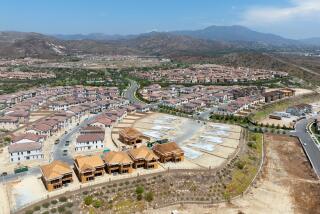So He Was Arab--Let’s Not Overreact
- Share via
William Shane was cleaning his garage in Irvine the day after the Fourth of July but quite willing to set that aside and tackle the thornier problem. We should all be so willing.
I asked him: What does it mean when an Arab American is linked to a possible terrorist action? And how should we react?
Those questions are on people’s minds this weekend after Hesham Mohamed Hadayet, also of Irvine, was shot to death at LAX after he opened fire on an Israeli airlines ticket agent and several other people in line behind him, killing two. Although it appears to have been an isolated act by a troubled man, it’s human nature to view the action against a backdrop of Mideast politics and the terrorist agenda of Al Qaeda and others.
Moreover, if a such a man can come from as sedate a setting as Irvine, should we suspect other neighbors with a similar background as well?
That’s what I’m asking Shane, the executive director of the county branch of the National Conference for Community and Justice. Among other things, the organization is trying to bridge the gap between the Muslim and non-Muslim communities. It has been part of several such efforts already in Irvine.
“A couple thoughts come to mind,” Shane says. “One definitely comes under the category of ‘Don’t overreact.’ Whether we’re talking 9/11 or 7/4, we’ve just got to keep things in perspective.
“Second, it’s another opportunity to engage the community in a dialogue over some rather broad issues revolving around prejudice and identity and unity, all those themes. We can take this as an opportunity to say there are bigger issues here.”
Shane’s Irvine home is not an ivory tower. He knows that for many Americans, Thursday’s one-man assault at LAX will be expanded into a condemnation of Arab Americans. Hadayet, according to authorities, was Egyptian-born and apparently had invoked the Koran in a message left at his home before he left on his fatal mission.
And that means ... what?
Probably nothing, other than one man with emotional problems acted on them in a terrible way.
“Who’s accountable?” Shane asks rhetorically. “People with Egyptian heritage? Muslims? Males? People of Irvine? Which of his groups are we going to target here?”
The answer is that, barring some further disclosures, what Hadayet did strikes a mark against his name and his name only.
American society tends to consider Muslims or Arab Americans “as if they’re all one, they all think in one way,” Shane says. “That is something we Americans do quite readily. We think of the Muslim community as one, [when] it’s obvious it’s no more one than the African American community or Jewish or fill-in-the-blank.”
Our heads know that people, for all different reasons, react violently every single day in America. Grievances are a dime a dozen. Angry husbands shoot their wives. Angry drivers shoot other drivers. Angry employees storm their offices and shoot their bosses.
Our heads know that. In Hadayet’s case, will our hearts follow?
Will we superimpose his actions on a Muslim and Arab American community that numbers an estimated 170,000 in Orange County and that had nothing to do with his rampage?
Those who knew Hadayet have their own challenge. Were there clues he was so close to the edge? Could they have done anything before he got to that point?
Those are the questions that always must be asked when violence flares out of control. They are questions about human nature, about individuals, about violence in America.
In this case, despite our ill-considered temptation to think otherwise, it’s not a question about being Muslim or Arab.
*
Dana Parsons’ column appears Wednesdays, Fridays and Sundays. Readers may reach Parsons at (714) 966-7821, by writing The Times’ Orange County edition, 1375 Sunflower Ave., Costa Mesa, CA 92626, or by e-mail to [email protected].
More to Read
Sign up for Essential California
The most important California stories and recommendations in your inbox every morning.
You may occasionally receive promotional content from the Los Angeles Times.










